

Trusteeships
Trusteeships
Shri Jamnalal Bajaj practised trusteeship in the truest sense. Today, we carry forward his legacy by aiming to make our society more egalitarian.
Shri Jamnalal Bajaj practised trusteeship in the truest sense. Today, we carry forward his legacy by aiming to make our society more egalitarian.
Our Trusts
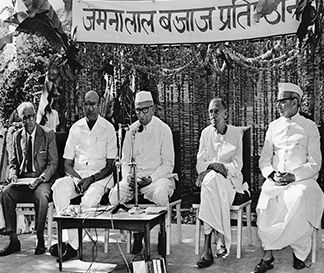
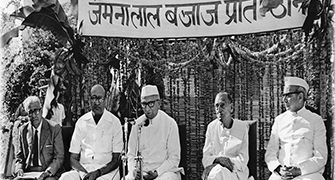
Jamnalal Bajaj Foundation
The Jamnalal Bajaj Foundation came into existence to promote Gandhian constructive activities devoted to the national cause.

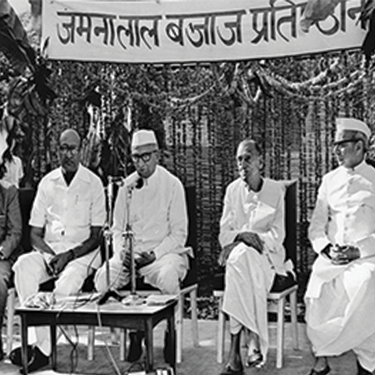
Our Trusts
Jamnalal Bajaj Foundation
The Jamnalal Bajaj Foundation was established in 1977, in the memory of Shri Jamnalal Bajaj. The Foundation has been respected as a Gandhian establishment in areas of developing the socio-economic arena in our country. It strives to serve the ideals of Shri Jamnalal Bajaj and promotes Gandhian constructive activities in India and abroad.
The Jamnalal Bajaj Foundation instituted Four Awards, to serve and propagate the ideals of Jamnalal Bajaj, in India and abroad. The annual awards are the Foundation’s gratifying felicitation to those men and women involved at the grassroots level who are committed to inclusive development working in line with Mahatma Gandhi’s constructive work program and who have taken a vow to selflessly serve the people, their community and nation, at large. There are three National Awards and one International Award.
Each award carries a Citation, a Trophy and a Cash Prize of Rs. 20,00,000 (for the International Award, the Cash Prize is equivalent to foreign exchange). 2023 being the Centennial Birth Anniversary of Shri Ramkrishna Bajaj, the Foundation has increased the prize amount of Rs. 10,00,000 to Rs. 20,00,000 in each award category, with effect from 2023 Jamnalal Bajaj Awards.
The Foundation donates to various institutions/NGOs to strengthen various community welfare activities The Foundation actively engages in rural development, fostering community involvement and common interest activities in Wardha, Maharashtra, and other parts of India. Significant funding is made to various programs, including income generation, skill development, sanitation, biogas projects, water supply, education, agriculture, and renewable energy, immunization, eye care camps, and numerous others. Supported institutions include Society for Rehabilitation of Crippled Children (SRCC) Hospital, Bhau Daji Lad Museum Trust, and Ashoka University, among others.
The Jamnalal Bajaj Foundation was established in 1977, in the memory of Shri Jamnalal Bajaj. The Foundation has been respected as a Gandhian establishment in areas of developing the socio-economic arena in our country. It strives to serve the ideals of Shri Jamnalal Bajaj and promotes Gandhian constructive activities in India and abroad.
The Jamnalal Bajaj Foundation instituted Four Awards, to serve and propagate the ideals of Jamnalal Bajaj, in India and abroad. The annual awards are the Foundation’s gratifying felicitation to those men and women involved at the grassroots level who are committed to inclusive development working in line with Mahatma Gandhi’s constructive work program and who have taken a vow to selflessly serve the people, their community and nation, at large. There are three National Awards and one International Award.
Each award carries a Citation, a Trophy and a Cash Prize of Rs. 20,00,000 (for the International Award, the Cash Prize is equivalent to foreign exchange). 2023 being the Centennial Birth Anniversary of Shri Ramkrishna Bajaj, the Foundation has increased the prize amount of Rs. 10,00,000 to Rs. 20,00,000 in each award category, with effect from 2023 Jamnalal Bajaj Awards.
The Foundation donates to various institutions/NGOs to strengthen various community welfare activities The Foundation actively engages in rural development, fostering community involvement and common interest activities in Wardha, Maharashtra, and other parts of India. Significant funding is made to various programs, including income generation, skill development, sanitation, biogas projects, water supply, education, agriculture, and renewable energy, immunization, eye care camps, and numerous others. Supported institutions include Society for Rehabilitation of Crippled Children (SRCC) Hospital, Bhau Daji Lad Museum Trust, and Ashoka University, among others.
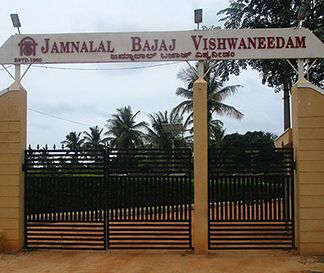
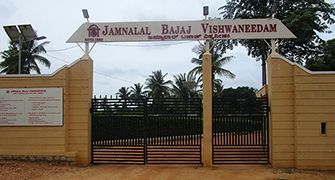
Jamnalal Bajaj Sewa Trust
The Jamanalal Bajaj Sewa Trust was the first charitable trust established at the initiative of Shri Kamalnayan Bajaj.
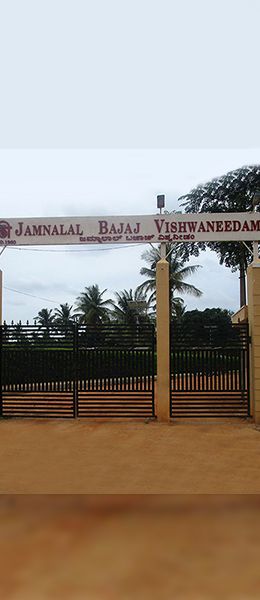
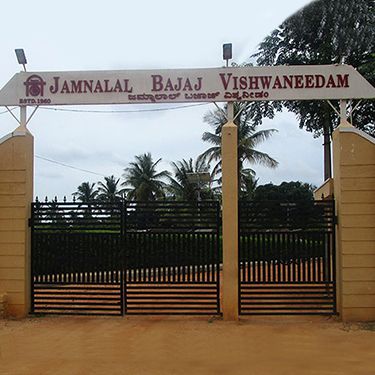
Our Trusts
Jamnalal Bajaj Sewa Trust
Jamnalal Bajaj Sewa Trust holds a unique and significant place in philanthropy and social service. Established in 1942 as the first charitable trust following the demise of Shri Jamnalal Bajaj, this noble initiative was spearheaded by Kamalnayan Bajaj.
Gandhiji, demonstrating his unwavering commitment to social causes, took the initiative to draft the Memorandum and Articles of Association along with outlining the trust's objectives. This act reflects the deep-rooted values and commitment to community welfare that both Jamnalal Bajaj and Gandhiji exemplified throughout their lives.
The Trust plays a pivotal role in addressing healthcare challenges in India by establishing modern hospitals with a focus on compassionate care for the underprivileged. Their initiatives span Primary, Secondary, and Tertiary health facilities, addressing issues like malnourishment, non-communicable diseases, and childhood health.
Collaborating with renowned institutions, they have opened eye hospitals providing free care. The trust is equally dedicated to enhancing education, supporting various projects in government and low-cost private schools, emphasizing quality education, and empowering women through vocational training. Additionally, their commitment extends to Environmental Sustainability, Water Conservation, Sanitation, Sports, and Cultural Endeavours, contributing to nurturing talent in various domains and supporting arts, culture, and heritage initiatives.
Jamnalal Bajaj Vishwaneedam (JBV), founded in 1960 is a not-for-profit organization based in Bengaluru, India in the memory of Shri Jamnalal Bajaj, offers skill-based training courses to help underprivileged women become economically independent and self-reliant. The organization is currently run by the Jamnalal Bajaj Seva Trust (JBST).
Hamaara Sapna, an initiative of the Jamnalal Bajaj Seva Trust provides opportunities to women from marginalized population to learn, imbibe and work towards a better tomorrow. It is a holistic method of education to give a broader outlook, self-confidence and self-respect. Women are trained in Computers, Spoken English, Tailoring and Yoga along with self-defence and many other activities.
Jamnalal Bajaj Sewa Trust holds a unique and significant place in philanthropy and social service. Established in 1942 as the first charitable trust following the demise of Shri Jamnalal Bajaj, this noble initiative was spearheaded by Kamalnayan Bajaj.
Gandhiji, demonstrating his unwavering commitment to social causes, took the initiative to draft the Memorandum and Articles of Association along with outlining the trust's objectives. This act reflects the deep-rooted values and commitment to community welfare that both Jamnalal Bajaj and Gandhiji exemplified throughout their lives.
The Trust plays a pivotal role in addressing healthcare challenges in India by establishing modern hospitals with a focus on compassionate care for the underprivileged. Their initiatives span Primary, Secondary, and Tertiary health facilities, addressing issues like malnourishment, non-communicable diseases, and childhood health.
Collaborating with renowned institutions, they have opened eye hospitals providing free care. The trust is equally dedicated to enhancing education, supporting various projects in government and low-cost private schools, emphasizing quality education, and empowering women through vocational training. Additionally, their commitment extends to Environmental Sustainability, Water Conservation, Sanitation, Sports, and Cultural Endeavours, contributing to nurturing talent in various domains and supporting arts, culture, and heritage initiatives.
Jamnalal Bajaj Vishwaneedam (JBV), founded in 1960 is a not-for-profit organization based in Bengaluru, India in the memory of Shri Jamnalal Bajaj, offers skill-based training courses to help underprivileged women become economically independent and self-reliant. The organization is currently run by the Jamnalal Bajaj Seva Trust (JBST).
Hamaara Sapna, an initiative of the Jamnalal Bajaj Seva Trust provides opportunities to women from marginalized population to learn, imbibe and work towards a better tomorrow. It is a holistic method of education to give a broader outlook, self-confidence and self-respect. Women are trained in Computers, Spoken English, Tailoring and Yoga along with self-defence and many other activities.
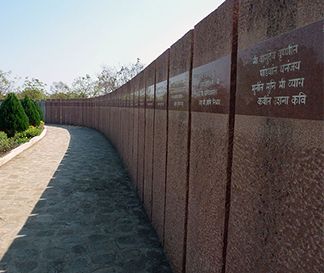
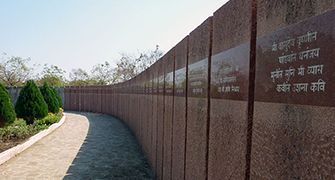
Kamalnayan Bajaj Charitable Trust
Kamalnayan Bajaj Charitable Trust operates the Gitai Mandir, Pujya Jamnalal Bajaj Exhibition, and Vinoba Darshan Complex at Wardha.

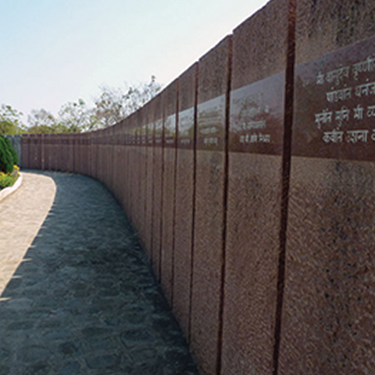
Our Trusts
Kamalnayan Bajaj Charitable Trust
Kamalnayan Bajaj Charitable Trust operates the Gitai Mandir, Pujya Jamnalal Bajaj Exhibition, and Vinoba Darshan Complex, an audio-video hall at Wardha. Additionally, it maintains a library containing literature and books on Mahatma Gandhi, Vinoba Bhave, Pujya Jamnalal Bajaj, Smt. Jankidevi Bajaj, and other freedom fighters.
Kamalnayan Bajaj Charitable Trust operates the Gitai Mandir, Pujya Jamnalal Bajaj Exhibition, and Vinoba Darshan Complex, an audio-video hall at Wardha. Additionally, it maintains a library containing literature and books on Mahatma Gandhi, Vinoba Bhave, Pujya Jamnalal Bajaj, Smt. Jankidevi Bajaj, and other freedom fighters.
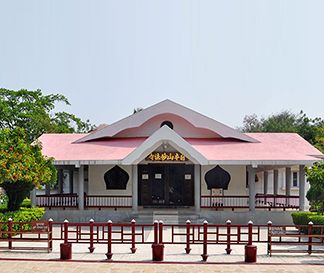
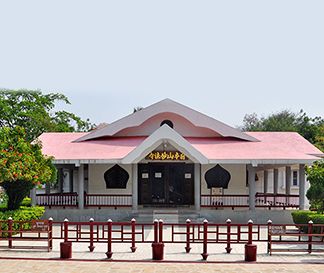
Fujii Guruji Memorial Trust
The Fujii Guruji Memorial Trust promotes the principles and teachings of Lord Buddha, Mahatma Gandhi, and other preachers.
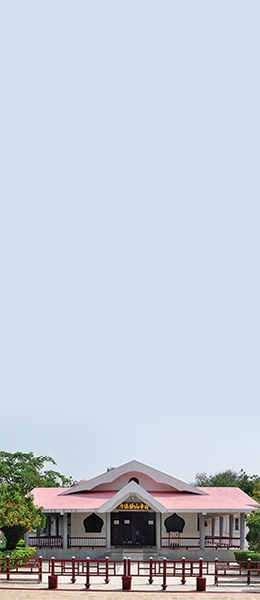
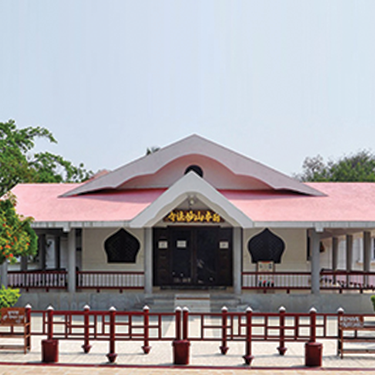
Our Trusts
Fujii Guruji Memorial Trust
Fujii Guruji Memorial Trust established the Buddha Mandir and the Vishwa Shanti Stupa at Wardha to promote the principles and teachings of Lord Buddha, Mahatma Gandhi, and other preachers. It aims to spread the message of world peace, love, non-violence and equality of all religions. It has also established Bal Sanskar Kendras to benefit underprivileged children, under the age of six, from small villages in the Wardha District.
Fujii Guruji Memorial Trust established the Buddha Mandir and the Vishwa Shanti Stupa at Wardha to promote the principles and teachings of Lord Buddha, Mahatma Gandhi, and other preachers. It aims to spread the message of world peace, love, non-violence and equality of all religions. It has also established Bal Sanskar Kendras to benefit underprivileged children, under the age of six, from small villages in the Wardha District.
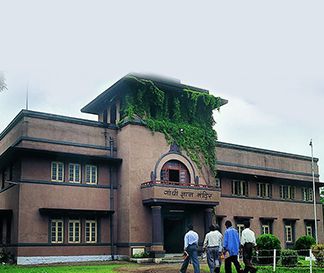
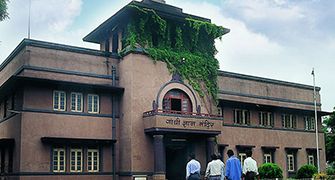
Group Trust For Colleges
Founded in 1914, the purpose of Shiksha Mandal is to provide affordable, high-quality education and contribute human resources for national development.

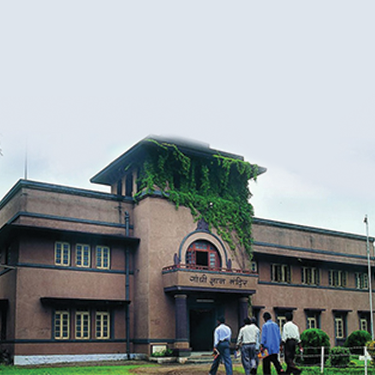
Our Trusts
Group Trust For Colleges
Founded in 1914 by Late Shri Jamnalal Bajaj, Shiksha Mandal, Wardha, runs seven institutions in Wardha and Nagpur with about 10,000 students. These include colleges for commerce, science, agriculture, engineering (polytechnic), and rural services. The purpose of Shiksha Mandal is to provide affordable, high-quality education and contribute human resources for national development.
Shri Nitin Gadkari, Shri Harish Salve, Justice Ravi Deshpande, Shri Udayan Sen, Shri Ramesh Chandak, and Shri Jaydeep Shah are a few of Shiksha Mandal's notable alumni.
Bajaj Science Centre was set up in 2008 to promote science and innovation in young minds, enabling them to become tomorrow's visionaries.
One of the commemorative initiatives of the Jamnalal Bajaj Centenary Year is the establishment of the Institute of Gandhian Studies (Gandhi Vichar Parishad), a non-profit educational organisation established at Wardha on October 7, 1987. The Institute's objective is to promote and research the life and principles of Mahatma Gandhi, his predecessors, current intellectuals, and social revolutionaries. The Institute's campus also has a Renewable Energy Education Park.
Founded in 1914 by Late Shri Jamnalal Bajaj, Shiksha Mandal, Wardha, runs seven institutions in Wardha and Nagpur with about 10,000 students. These include colleges for commerce, science, agriculture, engineering (polytechnic), and rural services. The purpose of Shiksha Mandal is to provide affordable, high-quality education and contribute human resources for national development.
Shri Nitin Gadkari, Shri Harish Salve, Justice Ravi Deshpande, Shri Udayan Sen, Shri Ramesh Chandak, and Shri Jaydeep Shah are a few of Shiksha Mandal's notable alumni.
Bajaj Science Centre was set up in 2008 to promote science and innovation in young minds, enabling them to become tomorrow's visionaries.
One of the commemorative initiatives of the Jamnalal Bajaj Centenary Year is the establishment of the Institute of Gandhian Studies (Gandhi Vichar Parishad), a non-profit educational organisation established at Wardha on October 7, 1987. The Institute's objective is to promote and research the life and principles of Mahatma Gandhi, his predecessors, current intellectuals, and social revolutionaries. The Institute's campus also has a Renewable Energy Education Park.
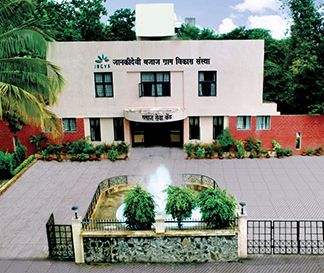
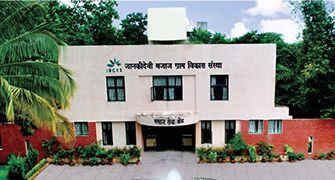
Janakidevi Bajaj Gram Vikas Sanstha
Janakidevi Bajaj Gram Vikas Sanstha plays a critical role in empowering underprivileged people by generating sustainable livelihood in the non-farm sector.

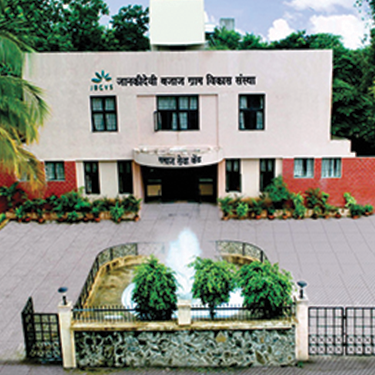
Our Trusts
Janakidevi Bajaj Gram Vikas Sanstha
Janakidevi Bajaj Gram Vikas Sanstha (JBGVS) plays a critical role in empowering underprivileged people by generating sustainable livelihood in the non-farm sector. It has developed three forms of interventions to accomplish this objective – Individual Enterprise Model, Group Enterprise Model & Skill Development, and Career Progression Model.
Under these models, the livelihood programmes focus on career progression, mentorship support (rural and urban), inclusion, outcome-led designs, and capacity building – pre- and post-employment support.
JBGVS Education programmes aim at the holistic development of children from all walks of life by providing learning platforms for children.
JBGVS aims to bridge the gap between the current and desired education situation through various internal interventions and partnerships with multiple organisations that specialise in dealing with problems that hamper the Indian education scenario today.
The objective of JBGVS programmes includes strengthening local leadership in the villages, empowering women through Self-Help Groups (SHGs), promoting local culture, rural sports, and so on. The purpose of these activities is to enable people, particularly youth and women, to continue the development activities once JBGVS withdraws from the villages. Organising Mahila Melavas (get-togethers of women) to increase interaction amongst women and raise awareness about social issues like dowry, female foeticide, domestic violence, and the menace of environmental degradation are some of the initiatives.
Janakidevi Bajaj Gram Vikas Sanstha (JBGVS) plays a critical role in empowering underprivileged people by generating sustainable livelihood in the non-farm sector. It has developed three forms of interventions to accomplish this objective – Individual Enterprise Model, Group Enterprise Model & Skill Development, and Career Progression Model.
Under these models, the livelihood programmes focus on career progression, mentorship support (rural and urban), inclusion, outcome-led designs, and capacity building – pre- and post-employment support.
JBGVS Education programmes aim at the holistic development of children from all walks of life by providing learning platforms for children.
JBGVS aims to bridge the gap between the current and desired education situation through various internal interventions and partnerships with multiple organisations that specialise in dealing with problems that hamper the Indian education scenario today.
The objective of JBGVS programmes includes strengthening local leadership in the villages, empowering women through Self-Help Groups (SHGs), promoting local culture, rural sports, and so on. The purpose of these activities is to enable people, particularly youth and women, to continue the development activities once JBGVS withdraws from the villages. Organising Mahila Melavas (get-togethers of women) to increase interaction amongst women and raise awareness about social issues like dowry, female foeticide, domestic violence, and the menace of environmental degradation are some of the initiatives.
